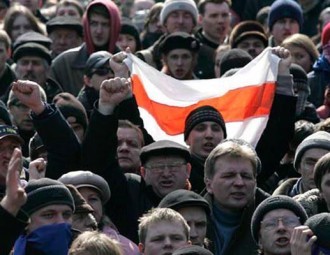Ales Bialiatski: Belarusian language today is an indicator of Europeanism

As the leader of “Viasna” believes, it’s time to return to the postulates of the 80s and the mission of the revival. Otherwise “Russian World” won’t leave any chances to be Belarusans in Belarus.
The so-called “Russian World” remains the biggest challenge for Belarus, stated the participants of a round table “Civil Society Advocating Civilizational and Cultural Identity of Belarus” organized by the Assembly of NGOs on 18th September in Minsk.
In his statement Ales Bialiatski suggested that all civil society organizations regardless of their profile, concentrate on Belarusianism now.
“EuroBelarus” Information Service publishes the most interesting moments from his statement.
Back to the 80s
Let’s recall the 80s, when we started speaking Belarusian and were reviving the tradition of the Belarusian language in cities. What’s the situation was like in those times? Those who were speaking Belarusian, were automatically considered nationalists; Belarusian language was an indicator of anti-Sovietism and one’s political orientation. One had to fight for his or her opinions and views. Nevertheless, the fight for the Belarusian language was quite successful, as in the late 80s these tendencies changed considerably. The letters to the Belarusian authorities were mostly about keeping Belarusian identity, development of Belarusian school, which was almost destroyed in cities. And those letters had quite big civil resonance; a lot of famous people signed them, so the authorities had to react somehow. Thus, such civil work brought its results; and though Belarus part of the Soviet Union then, in result of work of informal organizations, creative unions, and nationally oriented people in power, in 1990 the law on languages was signed. And this law was a real step forward in comparison with what we had earlier; it was a good start for Belarusization of our country. With the help of the civil pressure in 1994 Belarusian language became an official language of the state. It seemed that the political choice is made and there is no coming back. If the process continued naturally, in 2015 we would have had the whole Belarusian-speaking generation.
Reaction and consequences
Unfortunately, changes in the Constitution of 1995 that gave Russian and Belarusian languages equal rights worked not for the good of the Belarusian. And that resulted in reorientation on the Russian language and culture. Belarusian language is almost excluded from the state sector, and solitary cases when statements are made in Belarusian don’t change anything. We know that the system continues orienting towards Belarus’ russification, towards mental rapprochement between Belarusans and Russians, despite the latest developments in Ukraine demonstrating how quickly can the country be split if it is oriented towards Russian language and culture. Whereas in Minsk one doesn’t feel the barrier of lack of understanding, young people from Brest, Mahilieu, Homel perceive Belarusian as a foreign language, they don’t understand a thing.
What shall we do
At the same time, from the legal perspective, we have possibility to stand up for our language rights. If one’s language rights are violated and language is disrespect for Belarusian and violation of one’s language rights are liable. Thus, I think that we need to analyze the experience of our work with the regard for the current situation and revert to exerting pressure on the authorities, involving as many civil organizations as possible and using the legislation we have with the biggest possible efficiency. We should revive the slogans we used to have – democracy, human rights, independence, national and cultural revival. Everything we do should be done in the light of the Belarusian identity, Belarusian language, and securing Belarusian culture.
Change of European attitude towards national questions
As to the explanation of our attitude abroad, the situation is not as bad as it used to be 5 or 7 years ago. Europeans realized what threat poses the creeping expansion from the East; the expansion, found as early as in the tsarist Russia, continued in the Soviet Union, and reborn in Russia in relation to reservation of the Russian cultural area. Now Europeans understand that this has a huge political context. What can we oppose to this expansion? The answer is easy – our Belarusian idea, Belarusian culture, Belarusian national identity, and Belarusian language, which all of a sudden got a huge political context. Belarusian language today is an indicator of Europeanism
-
03.01
-
07.10
-
22.09
-
17.08
-
12.08
-
30.09



























